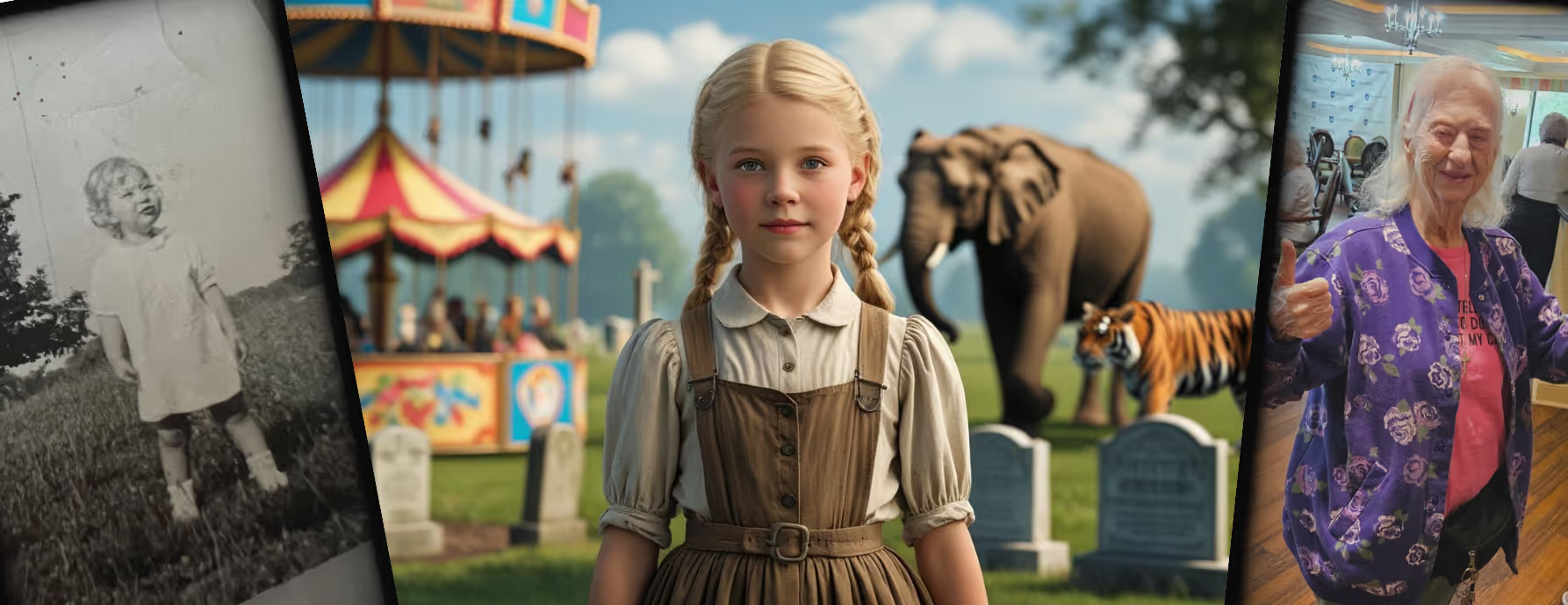
The Absolutely Incredible Life of Friendship Resident Nancy Jones
“When people ask me where I was born,” Ms. Nancy Jones says with a grin, “I tell them, ‘a cemetery.’”
And it’s true—well, mostly. She grew up in Bedford, Virginia, in a farmhouse out in the country, sitting on a stretch of land that bordered the town cemetery. “We were so close,” she says, “I used to tip-toe over as a toddler and take one little flower off a grave to keep.”
But that cemetery wasn’t the strangest thing about where Ms. Nancy lived. Not even close.
The real magic was in the backyard—where, several times a year, a carnival or a fair would roll in like a traveling dream. Some stayed for two days, others a week. Tents would pop up overnight. Ferris wheels would spin to life. Elephants and tigers would wander past their back windows like they were part of the family.
“And the best part?” she says. “We didn’t need a ticket. Me and my six brothers and sisters could walk out the back door and be in the fair.”
They rode every ride. Played every game. And the carnival workers, well, they knew who the family was. “We got free rides all day. No questions asked.”
When the carnival packed up, though, they weren’t exactly neat. Trash scattered the yard—big rolls of tickets, popcorn boxes, soda cups—and the family would spend the next few days picking it all up.
One year, while cleaning the field, they spotted something long and oddly shaped with bright colors all over it.
“It was a snake," Ms. Nancy says, eyes wide, “painted with red and blue diamonds! A real circus snake that somehow got left behind!”
Her daddy stood guard while the family called the police. “They thought we were making it up,” she laughs. “But that carnival came back real fast once they realized they were missing their star attraction.”
Then there was the elephant incident—
“One year, there was this man visiting the carnival with a wad of chewing tobacco. And for some dumb reason, he gave some of that tobacco to one of the elephants. Well, that elephant did not take kindly to it."
“He went crazy,” Ms. Nancy says, shaking her head. “Didn’t like it one bit. And you know what they say—elephants don’t forget. And I believe it.”
Sure enough, the next year when the carnival returned, so did the man with the chewing tobacco. And the elephant? Oh, he remembered.
“He had his eye on that man all day,” she says, leaning forward like she’s telling a ghost story. “Just watching him. Waiting. And then—that man went in to one of the portable toilets.”
And the elephant seized his moment.
“He marched right over and knocked it clean over. SPLAT. That man came rolling out in a mess. And I never saw him again after that!”
In the 1940s, the cemetery and fairgrounds were still in active use, but the town had begun developing a newer cemetery, Greenwood Cemetery, on the fairgrounds. Eventually, the fairgrounds that held so many of Ms. Nancy’s favorite childhood memories—rides, animals, and family—would be turned over to make room for a newer cemetery. “I was so sad when we had to move away from that house,” Ms. Nancy says quietly. “Momma said I cried for three weeks.”
“I had a great childhood,” she says. “How many kids can say they grew up in a cemetery—with a carnival?”
